Drinking Water Before Bed
Published:
The Effects of Drinking Water Before Bed
Drinking water before bed can have varying effects on individuals, with some finding it helpful for sleep while others experience sleep disruptions. As a modern-day blog editor experienced with SEO that writes with an active voice, I know that staying hydrated throughout the day is essential for overall health. However, consuming water right before bedtime may lead to sleep problems for certain people.
Contents:
- The Effects of Drinking Water Before Bed
- Nocturia and Sleep Disruptions
- When to Stop Drinking Water Before Bed
- Nocturia and Sleep Disruptions
- Hydration Throughout the Day vs Pre-Bedtime Consumption
- Drinking Cold Water Before Bed: The Surprising Connection to Better Sleep
- Anticipatory Thirst and Nighttime Hydration
- FAQs in Relation to Drinking Water Before Bed
- Conclusion
Benefits and Drawbacks of Pre-Bedtime Hydration
The benefits of drinking water include improved digestion, detoxification, and even a boost in mood according to a 2014 study. On the other hand, drinking too much water before bed might cause nocturia - waking up multiple times during the night to urinate - which can disrupt your restful slumber.
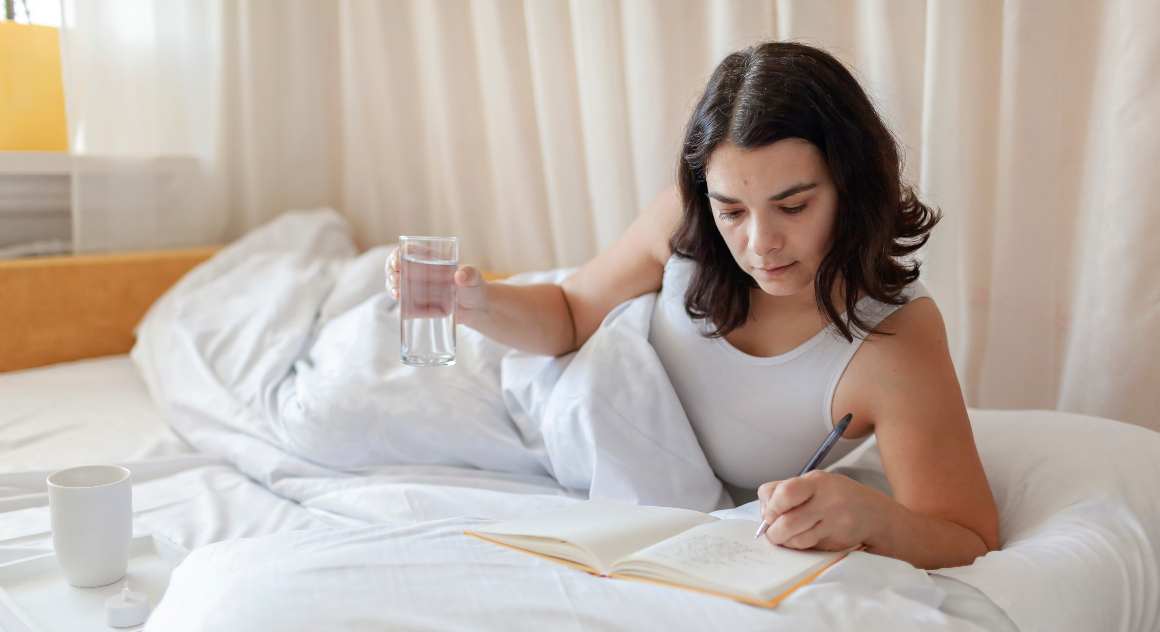
Factors Influencing Individual Responses to Nighttime Water Consumption
Several factors such as age, gender, medical conditions, and medications taken can influence how an individual responds to drinking water at night. Additionally, lifestyle habits like caffeine or alcohol intake may also play a role in determining whether pre-bedtime hydration helps or hinders one's quality of sleep.
Nocturia and Sleep Disruptions
Nocturia is not only annoying but could potentially affect your overall well-being due to interrupted sleep cycles leading to daytime fatigue or irritability. Causes of nocturia range from simple issues like excessive fluid intake close to bedtime or diuretic substances (caffeine/alcohol) to more complex medical conditions such as sleep apnea, diabetes, or bladder issues.
Strategies for Reducing Nighttime Bathroom Visits
To reduce nocturia and enhance slumber, attempt restraining liquid consumption in the evening and dodge consuming alcohol, caffeine, or sugary beverages prior to retiring. Additionally, addressing any underlying medical conditions with the help of a healthcare professional can also be beneficial in reducing nighttime disruptions caused by frequent urination.
When to Stop Drinking Water Before Bed
Sleep disorder specialist Jessica Vensel Rundo recommends stopping water intake two hours before going to bed. As a blog editor experienced with SEO, I know that maintaining proper hydration levels is important but so is getting a good night's rest - constant interruptions during sleep can result in sleep deprivation, which has numerous negative consequences such as anxiety, depression, and cognitive issues.
Recommended Timeframes for Cutting off Fluid Consumption
A general guideline would be to stop drinking fluids around 8 pm if you plan on going to bed at 10 pm. However, this may vary depending on individual needs and schedules.
Balancing Hydration Needs with Quality Rest
The key is finding a balance between staying hydrated throughout the day while avoiding excessive water consumption close to bedtime that could potentially disrupt your much-needed beauty sleep. To remain hydrated, keep a water bottle nearby during the day and drink plain water or warm water instead of hot water. If you feel thirsty before bed, take small sips of water instead of gulping it down. This will help you avoid feeling dehydrated without causing nighttime urination or dry mouth.
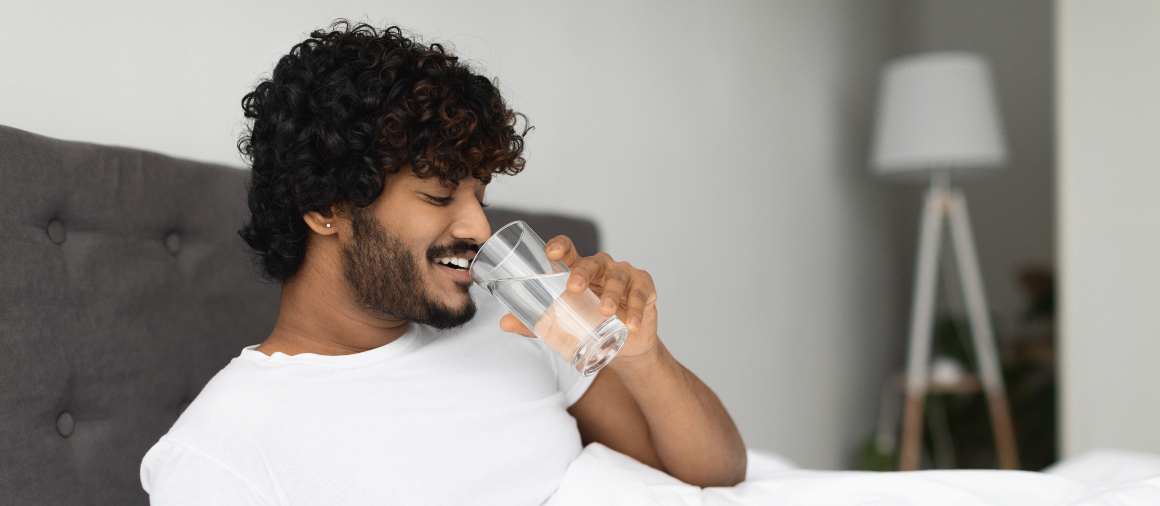
Nocturia and Sleep Disruptions
Let's talk about the elephant in the room: nocturia, the pesky issue of waking up multiple times at night to urinate, disrupting your precious sleep. According to a study published in Sleep Medicine Reviews, nocturia affects between 21% and 56% of adults. Yikes.
So, what causes this annoying nighttime visitor?
Causes of Nocturia
The primary culprit is drinking water before bed. But wait, there's more:
- Consuming caffeine too close to bedtime (hello, late-night coffee lovers)
- Sipping on alcohol before hitting the sack (sorry, wine enthusiasts)
- Gulping down sugary drinks as you tuck yourself in (I'm looking at you, soda aficionados)
Strategies for Reducing Nighttime Bathroom Visits
Fear not. You can take steps to minimize nocturia without sacrificing hydration or those occasional indulgences.
- Avoid excessive fluid intake during evening hours. Moderation is key.
- Cut off caffeine consumption several hours before bedtime - say goodbye to late-night espresso shots.
- If you must have an alcoholic beverage or sweet drink after dinner, do so earlier rather than later - remember moderation applies here too.
Bonus tip:
Consider incorporating a CBD product into your nighttime routine to potentially help improve sleep quality and reduce nocturia.
In conclusion, drinking water before bed can lead to nocturia and disrupted sleep for some individuals. But with the right strategies in place, you can maintain proper hydration while minimizing those pesky nighttime bathroom visits. Remember to keep a water bottle nearby and stay hydrated throughout the day. Sweet dreams.
When to Stop Drinking Water Before Bed
Let's face it, we all want to stay hydrated and healthy. But when it comes to bedtime, finding the perfect balance between hydration and sleep quality can be tricky. So, when should we cut off our water intake for optimal sleep?
Sleep disorder specialist Jessica Vensel Rundo has some advice for us on this matter. Rundo recommends stopping water intake two hours before going to bed. Simple as that.
- Maintain Proper Hydration:
Your body needs adequate fluids throughout the day for optimal functioning.
- Avoid Sleep Disruptions:
Frequent bathroom visits during the night can lead to interrupted sleep and a groggy morning after (no thanks.).
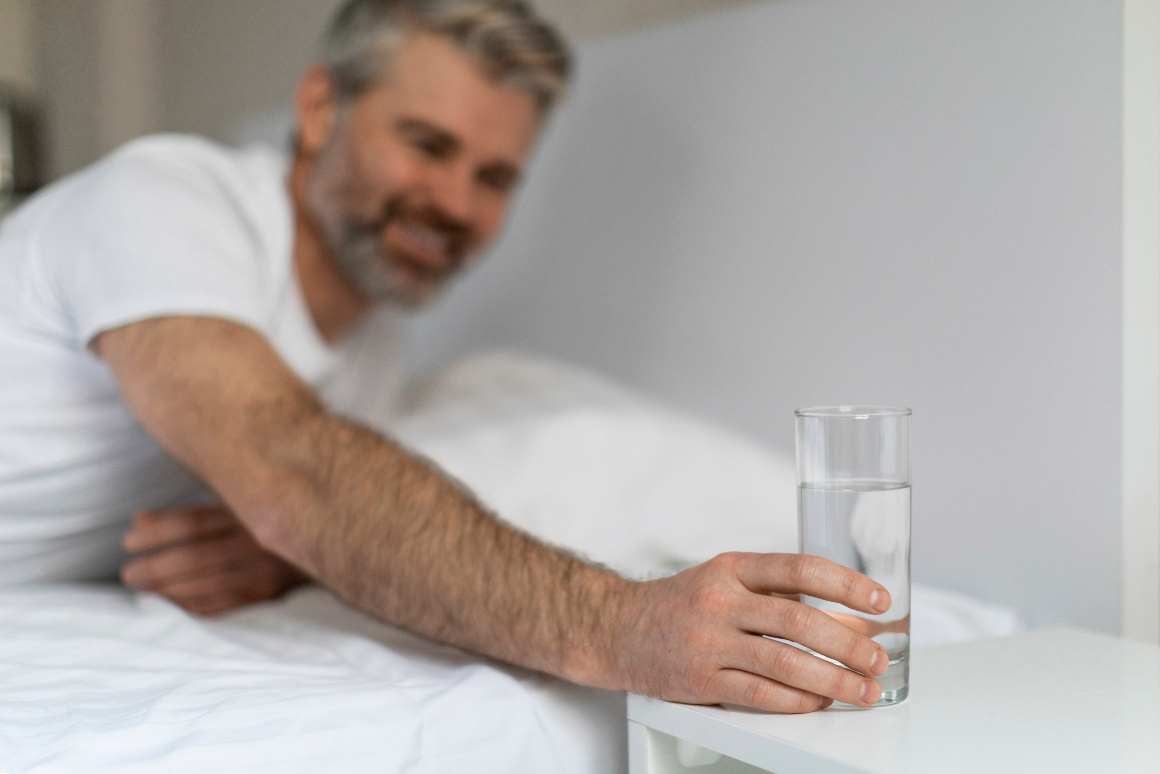
Recommended Timeframes for Cutting Off Fluid Consumption
- The Two-Hour Rule: Cut off your fluid consumption two hours prior to hitting the sack. This allows enough time for your kidneys to process any excess liquids without causing nighttime interruptions.
- H2O Throughout The Day: Sip on water consistently during daytime hours instead of chugging copious amounts just before bedtime - trust me, your bladder will thank you.
- Beware of Caffeine & Alcohol: Avoid consuming caffeinated or alcoholic beverages too close to bedtime as they may contribute further towards nighttime bathroom visits.
Balancing Hydration Needs with Quality Rest
As much as we love water, it's essential to prioritize a good night's sleep too. Constant interruptions during the night can result in sleep deprivation, which has numerous negative consequences such as anxiety, depression, and cognitive issues.
To strike that perfect balance between hydration and restful sleep, make sure you're drinking enough water throughout the day while also following Rundo's two-hour rule before bedtime. Remember: a well-hydrated body is a happy body - but so is one that gets quality shut-eye.
Hydration Throughout the Day vs Pre-Bedtime Consumption
Let's get one thing straight: staying hydrated is essential for our overall health and well-being. However, when it comes to pre-bedtime water consumption, there are some misconceptions that need debunking. So, let's dive into the facts and separate hydration myths from reality.
The Importance of Consistent Daily Hydration
Our bodies depend on water for various functions, such as digestion, circulation, and temperature regulation. A 2014 study found that inadequate fluid intake can negatively impact mood and cognitive function. This means sipping water throughout the day is crucial for maintaining optimal mental and physical performance.
Dispelling Myths About Pre-Bedtime Water Consumption
You might have heard claims about drinking a glass of water before bed being beneficial in terms of detoxification or weight loss, but do these hold any truth? The answer: not really. No significant evidence suggests specific benefits associated with pre-bedtime water consumption compared to consistent hydration during daytime hours.
Actionable Tips for Maintaining Proper Hydration Levels:
- Morning Kickstart: Start your day with a glass of warm lemon-infused water to jump-start your metabolism and promote healthy digestion.
- Sip Regularly: Keep a reusable water bottle nearby at all times as a reminder to drink up throughout the day.
- Listen to Your Body: Thirst is not always an accurate indicator of your hydration needs, so pay attention to other signs like dry mouth or dark urine.
In summary, consistent hydration during the day is essential for optimal health and well-being; excessive water consumption before bed should be avoided. The key takeaway: hydrate consistently during daytime hours and avoid excessive water intake before bed. Your body (and sleep) will thank you.
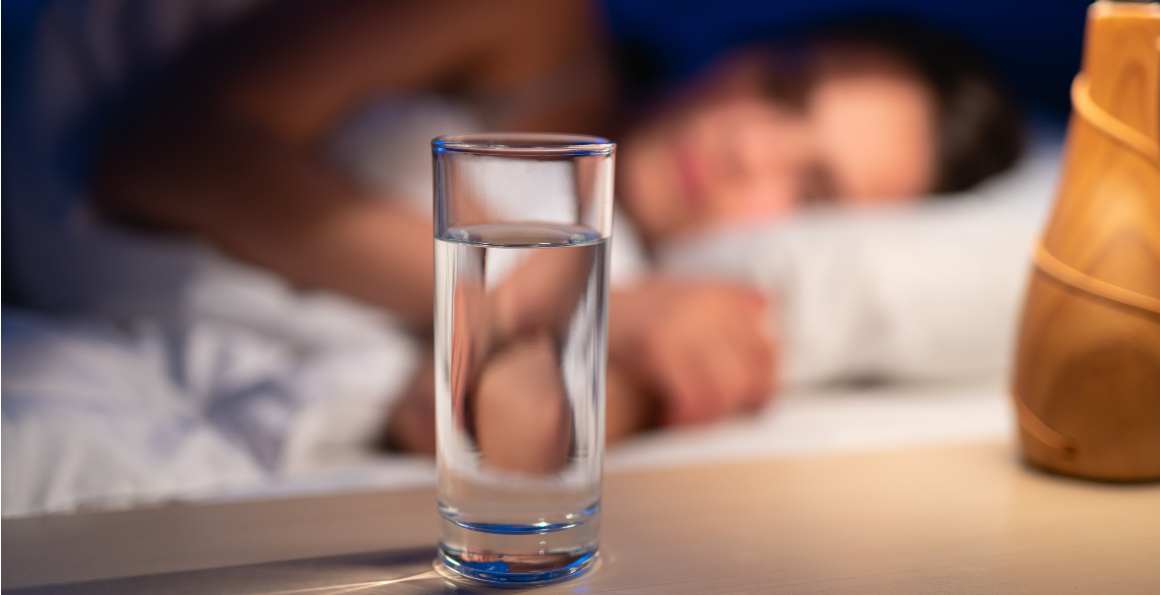
Drinking Cold Water Before Bed: The Surprising Connection to Better Sleep
Let's face the frigid facts. Drinking cold water before bed might just be the ticket to a better night's sleep. But wait - there's more to it than simply chugging an icy glass of H2O right before hitting the hay.
The Role of Body Temperature in Sleep Quality
Our physical temperature has a major influence on the quality of our sleep; research reveals that cooler temps can lead to quicker nodding off and more restful slumber. Research shows that cooler temperatures can help facilitate falling asleep faster and enjoying deeper slumber throughout the night.
This is where drinking cold water comes into play.
How Much Cold Water Should You Drink Before Bedtime?
Finding the perfect balance between hydration and sleep quality is key here. A small glass of chilly water might do wonders for some people while others may need slightly more or less to achieve their desired snooze-inducing effect.
So, is drinking cold water before bed a magical sleep elixir? It's really up to you - everyone is different, so your results may vary. If you're curious about whether this chilly habit can help improve your sleep quality, why not give it a try tonight?
You never know - those frosty sips just might be the key to unlocking better rest and sweeter dreams.
Anticipatory Thirst and Nighttime Hydration
Picture this: You're all tucked in, ready for a good night's sleep, but suddenly you feel thirsty. Welcome to the world of anticipatory thirst.
Anticipatory thirst is that nagging feeling of needing a drink right before bedtime, even if you've been hydrating throughout the day.
Fear not. We have some strategies to help you quench your nighttime thirst without disrupting your precious slumber.
Understanding Anticipatory Thirst
First things first - let's understand what causes anticipatory thirst.
Your body has an internal clock called the circadian rhythm, which regulates various physiological processes including fluid balance and urine production at different times of the day and night.
This means that sometimes, despite staying hydrated during daytime hours, your body may still crave water before bed due to its natural rhythms or other factors like stress or exercise habits.
Strategies for Addressing Nighttime Thirst Without Disrupting Sleep
- Sip small amounts: Instead of chugging down a full glass of water just before bed (hello nocturia.), try sipping on smaller amounts when experiencing anticipatory thirst. This can help satisfy your craving without overloading your bladder.
- Choose the right drink: Opt for plain water or a non-caffeinated herbal tea, as caffeine and sugary drinks can exacerbate thirst and disrupt sleep.
- Maintain daytime hydration: As mentioned earlier, staying well-hydrated throughout the day is crucial. Consume 8 glasses of water daily to keep your body functioning at its best.
- Create a bedtime routine: Establishing a consistent pre-sleep ritual that includes relaxation techniques like deep breathing exercises or meditation can help reduce stress-induced thirst before bed.
By following these strategies, you'll be able to address your nighttime thirst without compromising on quality rest.
Incorporate them into your daily routine and enjoy sweet dreams with proper hydration levels - it's truly a win-win situation.
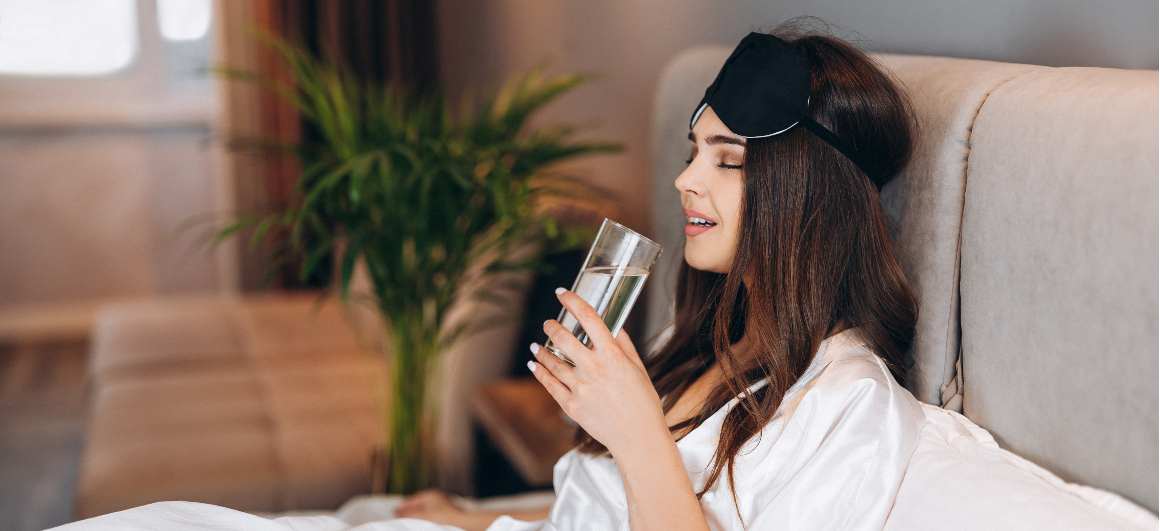
FAQs in Relation to Drinking Water Before Bed
Is it Good to Drink Water Before Bed?
Drinking a moderate amount of water before bed can be beneficial for maintaining hydration levels and supporting bodily functions. However, excessive fluid intake close to bedtime may lead to nocturia (frequent nighttime urination) and sleep disruptions. It's essential to balance your hydration needs with quality rest.
Is Drinking Water Before Bed Good for Your Heart?
Maintaining proper hydration is important for overall health, including heart function. Drinking a small amount of water before bed may help support healthy blood circulation and prevent dehydration-related issues like high blood pressure. However, excessive fluid intake at night should be avoided as it could disrupt sleep.
Is Drinking Water Before Bed Good for Your Kidneys?
Kidneys require adequate hydration to function properly; however, consuming too much water right before bedtime might strain them by increasing urine production during the night. To maintain kidney health without disrupting sleep patterns, focus on consistent daily hydration rather than overloading fluids just prior to sleeping.
How Many Hours Before Bed Should I Stop Drinking?
To minimize nocturia and ensure uninterrupted sleep, consider stopping or reducing fluid consumption about 2 hours prior to bedtime. This allows enough time for the body to process liquids while still providing necessary nighttime hydration.
Conclusion
Drinking water before bed can have both benefits and drawbacks, depending on individual responses to nighttime hydration. While it can help with overall hydration levels and promote healthy bodily functions, it may also lead to sleep disruptions due to increased bathroom visits.
To reduce the likelihood of nocturia and other sleep disturbances, it's recommended that individuals avoid drinking water a few hours before bedtime. However, maintaining consistent daily hydration is crucial for overall health and staying hydrated throughout the day.
If you're looking to improve your daily fluid intake, consider drinking warm water instead of cold water. Warm water can help with digestion and may also help you feel less thirsty throughout the day. Additionally, keeping a water bottle nearby can help you remember to drink enough water and remain hydrated.
While drinking hot water before bed may seem like a good idea, it's important to note that it can also lead to sleep disruptions and mild dehydration. Instead, stick to plain water and try to drink enough throughout the day so that you don't feel thirsty at night.
Overall, it's important to listen to your body and adjust your water intake accordingly. If you feel thirsty, drink water, but try to avoid drinking too much before bed. This can help you avoid nighttime urination and other sleep disturbances that can lead to poor sleep and sleep loss.








